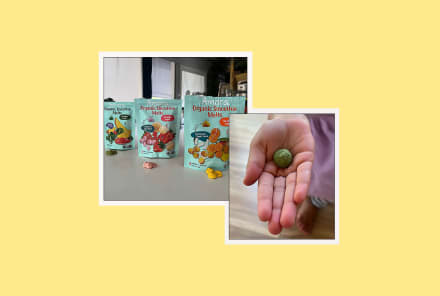Advertisement
How To Spot Red Flags In Yourself, From Relationship Experts


Modern dating culture has taken the concept of red flags and run with it, even inspiring people to share their lengthy and hyper-detailed lists of such flags on TikTok. People use the term to apply to anything from rigid pet peeves and personal preferences to more prominent signs of incompatibility.
While hunting down these warning signs in others may be important for relationships in its own right, one crucial piece of the puzzle is often missing: identifying your very own red flags as well.
How exactly to do this is a broad query, so we asked relationship and psychology experts for the best approach. To come, a few tips from the pros and why it matters.
What are red flags?
"When I think of red flags, I think about the nonstarters or 'hard stops' that might come up in relationships that essentially make a relationship between people unsustainable," explains Jor-El Caraballo, LMHC, licensed therapist and co-founder of Viva.
Others may describe it as a trait or behavior they notice in someone else that encourages them to walk away from the connection. Remember: These aren't always easy to spot early on, and hindsight is 20/20, so give yourself some slack if you've missed (or ignored) some red flags in past relationships.
On a similar but less intense note, "Yellow flags are those signs that we need to proceed with caution and collect more data before reaching a conclusion about the fate of the connection," Caraballo says.
"In stark contrast, green flags are those signs that it would be great, and fruitful, to continue to invest in the relationship moving forward," he adds. It's important to note the positive traits as well, for the sake of a balanced outlook.
Objective vs. relational vs. personal red flags
According to psychotherapist and dating expert Ken Page, LCSW, you can break down red flags into three broad categories: objective, relational, and personal red flags. Here's what they mean:
- Objective: These are behaviors that are objectively unhealthy for a relationship and may include things like an active addiction, emotional abuse, physical abuse, sexual abuse, lying, a history of consistent infidelity, chronically selfish behavior, and narcissistic tendencies.
- Relational: This one has to do with the dynamic between the two parties rather than either person individually. "For example, it could be a relationship with someone who tends to be very controlling paired with a partner who tends to be really passive. That could be OK if they're working on it, but it could also continuously trigger both of them. It's not that either of them is a bad person or couldn't be in a good relationship with someone else, but with each other, it could be a red flag," Page explains.
- Personal: Lastly, we have personal red flags. In this instance, we mean red flags you spot in others that are unique to you. This could trigger you, make you feel unsafe, angry, etc., but might not come off as a bad thing to everyone. In other words, someone else may not see it as a red flag, but it certainly is for you, and that's OK.
Why it's important to identify your own red flags
So, why should you work on recognizing your own red flags? And by that, we're talking about the red flags other people see in you in relationships—i.e., the things that might make people question whether they should date you.
"Being conscious of our red flags is important because it offers us the opportunity to take an honest look at where we are emotionally and psychologically and identify parts that still need healing or repair before we attempt to engage in deep, intimate connections again," Caraballo says.
"Identifying our own red flags gives us a more accurate view of our relational capacity and ability at a given time," he adds. In other words: Knowing your own red flags can help you identify habits you can work on, what you need to disclose to your partner for the sake of a better relationship, or even if you're ready for a relationship at all.
How to identify your own red flags
Before we get into the how-to, a quick caveat: You can't always predict which of your behaviors will trigger someone else (unless they're objective red flags we mentioned earlier). However, you can work to identify what triggers you, unhealthy behaviors you have, or ways you can improve your relationship skills. Here's how:
Spend some time observing.
As with many experiments, start by observing. You can observe your own behaviors, thoughts, and feelings in a journal or the notes app on your phone. "Take a few days and notice the things that hurt your heart and the things that fill your heart," Page recommends. Write down what makes you feel unsafe, angry, sad, or jealous in relationships.
Do this until you collect a few common themes. If you're not currently in a relationship, think back to a previous one you had or imagine your reaction to future events.
Figure out the "why."
Next, ask yourself why those things trigger you—is it the other person acting with malicious intent, or is it more related to unhealed trauma? This could reveal something you should continue healing that you may have previously put aside.
Having unresolved trauma is not a red flag per se, but it is something you'll want to be mindful of as you go forward in the dating process.
Imagine dating yourself.
This one is easier said than done, but it's worth the effort. Ask yourself questions like: What would I love about dating myself? What are some things I would become frustrated with? You can use these as thought prompts, conversation prompts with a trusted friend or partner, or journal prompts.
What you may become frustrated with as a partner may reflect a potential red flag in yourself.
Here's a quick list of some examples of possible red flags for brainstorming purposes:
- You get quiet when you're upset rather than communicate openly.
- You have trouble setting boundaries with others.
- You intentionally try to make your partner jealous for attention.
- You love bomb people.
- You raise your voice easily.
- You have trouble admitting when you're wrong.
- You have trouble trusting others.
Do this with self-compassion and curiosity rather than criticism. If you feel yourself being too harsh on yourself, divert to this question: "'If my friend had this red flag, would I be judging them? How can I show myself this same kindness and consideration?'" recommends psychologist Perpetua Neo, DClinPsy.
Ask a past partner.
If you're on steady ground with a past partner, it might be worth picking their brain for some growth points. Sexologist Shan Boodram previously dove into this topic with mbg and recommended reaching out to an ex-partner to have a sincere, honest, peaceful conversation.
Of course, proceed with caution whenever reaching out to an ex. The purpose of the activity isn't necessarily to create closure or to smooth over any lingering tensions, she emphasizes. Rather, the purpose is to get a clear window into what you specifically were like in the relationship, what your strengths were, and what made you challenging to be with.
A few of the questions she recommended asking:
- Was I a good listener to you?
- Did you find me reasonable?
- Was I too sensitive or emotionally unstable?
- Was I emotionally unavailable or distant?
- Did I make an effort to understand and meet your needs?
- Did I apologize often and effectively to you if I was in the wrong?
- Did you consider me an independent person or a needy person?
- Where do you think we were incompatible?
How to address your own red flags
If you have access to a therapist, they can be extremely helpful for this entire process, especially in planning out the next steps. However, you can certainly work on your red flags solo, too. Approach it as you would a typical self-improvement journey—here are a few ideas:
Be more mindful.
At the core, just knowing you have something to work on is a great start. When you notice yourself displaying your red flag, take a mental note.
Practice.
The only way to become a better partner IRL is to practice! For example, if your red flag is trouble setting boundaries, experiment with setting small boundaries every once in a while to strengthen that mental muscle. If you raise your voice easily, go on a walk before responding to a conversation. If you struggle with codependency, work to stop being emotionally dependent on others. The list goes on.
Be open about it.
If you're in a relationship, tell your partner about the red flag in question (and if you feel too nervous to discuss something you're working on, that may be a relational red flag in itself!). Remember that everyone has things to work on, and self-improvement is sexy. What's more, "This helps them have a fuller context of where you are in your life and identify places where they may need an extra dose of patience and compassion as you continue your internal work," Caraballo says.
Ask for help.
As mentioned above, discussing your own red flags with a therapist can be tremendously helpful. In addition, ask trusted friends or family members to help you brainstorm healthy ways to work on behaviors or habits that you've identified.
Don't rush it.
As with any journey, this can take some time. Plus there's no blueprint for how to do it. As Page describes the process, "It's an adventure of growth that most of us are not taught to go on." So be kind to yourself throughout this journey, and know that you won't become a better partner in one day.
FAQ:
How do I know if I have red flags in relationships?
You can't always predict which of your behaviors will trigger someone else, but some objective red flags include active addiction, lying, consistent infidelity, physical abuse, and emotional abuse. Apart from those, you can also work to identify other unhealthy behaviors you have in relationships, your common triggers, and other ways you can improve your relational skills.
What are some common red flags?
Some of the more glaring, objective red flags include active addiction, lying, consistent infidelity, physical abuse, and emotional abuse. Other common red flags include struggling to admit when you're wrong, constantly questioning your partner's commitment, raising your voice easily, or getting quiet when you're upset instead of communicating openly about it.
The takeaway
While keeping an eye out for red flags in potential partners is important, so is identifying possible red flags in yourself. In order to start this journey, spend some time figuring out what situations trigger you, put yourself in your partner's shoes, and practice healthier behaviors. As always, don't be afraid to ask for help. Lastly, pepper in identifying green flags in yourself and others every once in a while too—here are 16 positive traits to look for.
Watch Next
Enjoy some of our favorite clips from classes
Enjoy some of our favorite clips from classes
What Is Meditation?
Mindfulness/Spirituality | Light Watkins
Box Breathing
Mindfulness/Spirituality | Gwen Dittmar
What Breathwork Can Address
Mindfulness/Spirituality | Gwen Dittmar
The 8 Limbs of Yoga - What is Asana?
Yoga | Caley Alyssa
Two Standing Postures to Open Up Tight Hips
Yoga | Caley Alyssa
How Plants Can Optimize Athletic Performance
Nutrition | Rich Roll
What to Eat Before a Workout
Nutrition | Rich Roll
How Ayurveda Helps Us Navigate Modern Life
Nutrition | Sahara Rose
Messages About Love & Relationships
Love & Relationships | Esther Perel
Love Languages
Love & Relationships | Esther Perel
What Is Meditation?
Box Breathing
What Breathwork Can Address
The 8 Limbs of Yoga - What is Asana?
Two Standing Postures to Open Up Tight Hips
How Plants Can Optimize Athletic Performance
What to Eat Before a Workout
How Ayurveda Helps Us Navigate Modern Life
Messages About Love & Relationships
Love Languages
Advertisement

I'm A Couples' Counselor & This Is The No. 1 Activity For A Lasting Relationship
Rachel Glik, Ed.D., LPC

I'm A Couples' Counselor & This Is The No. 1 Activity For A Lasting Relationship
Rachel Glik, Ed.D., LPC









